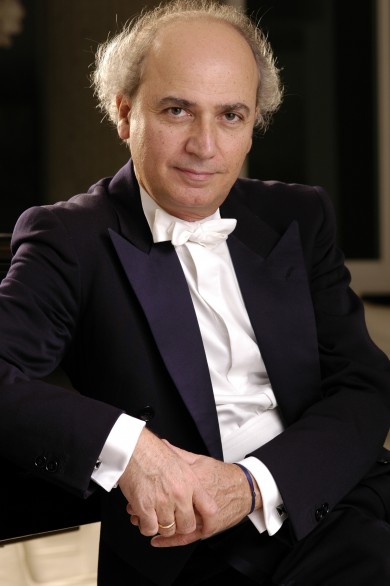Marturet, Miami Symphony close season with rich Brahms program

Eduardo Marturet conducted the Miami Symphony Orchestra in a Brahms program Friday night at the Arsht Center.
The Miami Symphony Orchestra concluded an impressive season Friday night with an all-Brahms program at the Arsht Center. Music director Eduardo Marturet has recorded the four Brahms symphonies and brings a special passion to the German master’s scores.
The conductor imbued Brahms’ Piano Concerto No. 1 in D minor with a potent sense of gravitas, tempered with flowing lyricism. A work of granite-like power, the concerto requires a soloist with stunning keyboard technique and deeply probing artistic insight.
French pianist-conductor Philippe Entremont has had an international career spanning more than five decades. In his prime, Entremont was an impressive interpreter of the glittering concerto showpieces of Saint-Saens, Rachmaninoff and Tchaikovsky and a stylish exponent of the impressionistic miniatures of Debussy and Ravel. He could play an agile Mozart concerto when collaborating with the right conductor but the massive, symphonic concertos of Brahms were never his forte.
Now in his late seventies, Entremont no longer possesses the kind of technical arsenal that propelled him to competition wins and major concert appearances in his early twenties. Following a solid reading of the lengthy opening orchestral tutti, Entremont faltered in the piano’s initial entry. He quickly recovered but he seemed to be struggling through much of the first movement.
While Marturet captured the song-filled melody of the Adagio, Entremont’s phrasing was often pedestrian and stolid. There seemed to be a disconnect between the conductor’s broadly shaped line and the pianist’s matter of fact delivery. The Allegro ma non troppo finale was often approximated, at times becoming a wild scramble of notes. Despite Entremont’s less-than stellar-performance, Marturet drew strongly focused, well disciplined playing from the ensemble. The crucial horn solos were well articulated.
Marturet launched the Symphony No. 4 in E minor in a taut, fiery manner. Lustrous strings and lovely solo winds contributed to a strong reading of the tempest-tossed first movement. Marturet’s exciting traversal built to a climax of monumental strength, the full orchestra resounding strongly over sustained timpani rolls.
The opening horn calls of the Andante moderato were spot on, Marturet shaping the wind melody with surging nobility. The rich, dark sonority of the lower strings propelled the soaring melodic line of the secondary theme. Marturet’s finely shaded dynamics and sure control made the sudden full orchestral outbursts all the more dramatic and powerful. A brisk pace set the Allegretto in motion, the trio more leisurely before the wild, exciting dash to the conclusion.
The musical architecture of the final passacaglia was superbly delineated. Contrapuntal lines were clear and transparent, the precision of the string playing particularly distinguished. The brass brought solidity and impact to the chorale melody and the crucial flute solos were beautifully played. Marturet effectively conveyed Brahms’ play of light and shadow, the momentum never flagging until the brisk, emphatically accented final chords. Strongly played and conducted with fervor, the Brahms symphony concluded the orchestra’s season on a high note.
_____________________
The 2013-2014 season of the Miami Symphony Orchestra celebrates the ensemble’s 25th anniversary. There will be seven orchestral programs plus a special chamber music concert. Performances will be presented at the Arsht Center, Florida International University’s Wertheim Auditorium, the New World Center, the University of Miami Gusman Concert Hall and South Miami-Dade Cultural Arts Center.
Featured soloists include guitarist Angel Romero, flutist Nestor Torres, double-bassists Jeff Bradetich and Luis Gomez Imbert, pianists Andreas Boyde and Konstantine Soukhovetski and organist Kiran Shiva Akal. Concertmaster Daniel Andai teams with cellist Brian Manker for Brahms’ Double Concerto. Rising Mexican conductor Alondra de la Parra leads a Valentine’s Day program and Andai conducts a chamber orchestra concert.
South Florida premieres of Paul Schoenfield’s Piano Concerto (“Four Parables”), Marquez’s Danzon No. 3 for flute and guitar and Scriabin’s Prometheus – The Poem of Fire will be featured. World premieres of music director Eduardo Marturet’s Homage to Waldo, the Rodrigo-Romero Rincones de Espana and Orlando Garcia’s Voces Celestiales for two double basses share the programs with more familiar fare by Bernstein, Gershwin, Prokofiev, Ravel , Bach, and Tchaikovsky. Call 305-275-5666 or log on to themiso.org.
Posted in Performances
Leave a Comment
Sat May 4, 2013
at 11:37 am
No Comments






